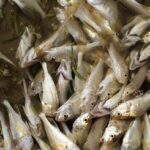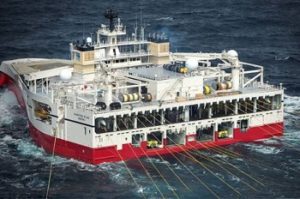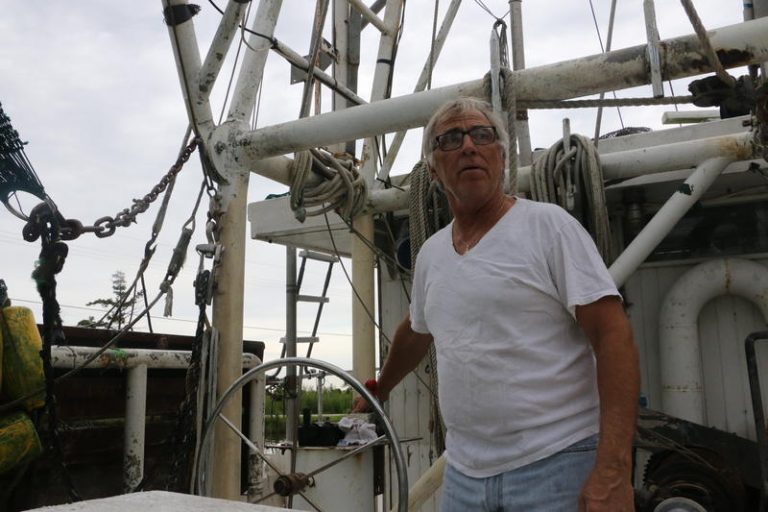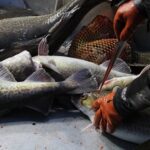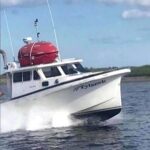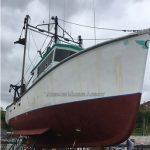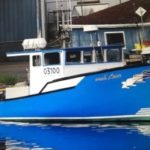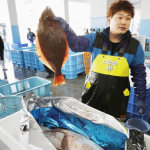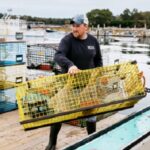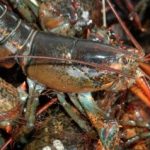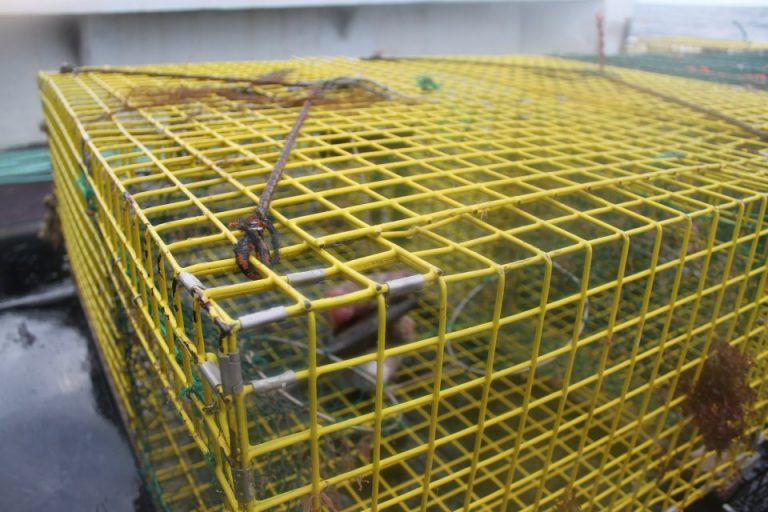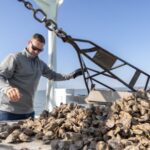Daily Archives: August 9, 2018

Louisiana shrimpers consider strike as prices plummet
Louisiana shrimpers vowed this week to go on strike if shrimp prices take yet another tumble. About 200 shrimpers gathered in Houma on Wednesday (Aug. 8) to vent their frustrations about foreign imports that have driven shrimp prices to levels not seen since the 1980s. They also fumed over a lack of political support for tariffs and other measures that could shore up an industry they say is heading toward extinction. “We can’t make it on cents. We need dollars,” said Dean Blanchard, a Grand Isle shrimp distributor. “There’s no way this can continue.” >click to read<21:59

Saugus lobsterman is trying to put his life back together after losing his home and his job
An orange lobster boat “Dependable” sits patiently in the Saugus River. Its captain, George Mabee, is healing from wounds sustained in a house fire two weeks ago and is unable to work. “The season is just starting to kick off now, it’s just picking up,” said Mabee. “Unfortunately, I’m not allowed to be there to do anything because I’m too prone to infection right now. Lobstering is my whole business.” July 29 started off as a normal day for Mabee, a commercial fisherman. But by the end of it, he found himself lucky to be alive. >click to read<19:29
A Fundraiser for Saugus Ma. Lobsterman George Mabee – >click to read<

A Fundraiser for Saugus Ma. Lobsterman George Mabee
George is a local fisherman that lost everything he owned in a devastating fire at his home in Saugus on July 29th. He managed to escape, suffering third degree burns. He is staying with family during his recovery. George has a long road ahead of him and we want to make his recovery comfortable so he can focus on healing. Any amount is appreciated and will make a difference. Please, if you can, >click to donate<19:20
Saugus lobsterman is trying to put his life back together after losing his home and his job – >click to read<
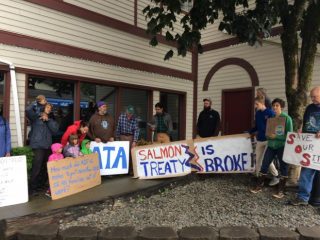
Trollers call for Murkowski’s aid with treaty
“You take our fish, you take our lives!” This is the fourth time salmon trollers have taken to the streets during the 2018 season to protest proposed cuts to the chinook harvest in the Pacific Salmon Treaty. In May, trollers gathered outside Sitka’s Centennial Building prior to the start of a state salmon symposium hosted by ADF&G Commissioner Sam Cotten. When Governor Bill Walker visited Sitka in June, dozens of fishing vessels paraded up and down the harbor, asking that Walker refuse to sign the treaty, if it forced Alaska trollers to trade a share of the king salmon harvest to Canada, to protect endangered stocks in Washington. Trollers then organized a rally in Sitka’s harbor prior to the start of the July 1 opener, where one fisherman symbolically used a flare to burn his boat payments. >click to read<17:41
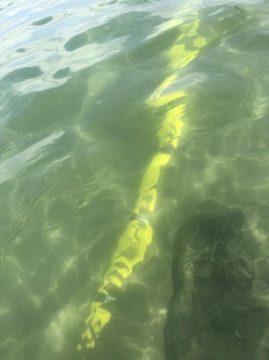
Exposed wind farm electric transmission line at Block Island beach causing concern
There is a controversy over a high voltage power line to and from Block Island that’s supposed to be buried. But it’s not. In fact, at low tide on Wednesday, it was just below the waterline at State Beach, which is also known as Crescent Beach and is the most popular on Block Island. You can still see the yellow covering wrapped around the 37,500-volt National Grid powerline that runs the juice generated by the Deepwater Wind turbines through a buried junction box, to the mainland, and the electricity back again to island ratepayers. National Grid released a statement, noting that shifting sediment is the cause for the lines exposure, but added that they are “confident” it’s safe. >click to read<14:02
Cable exposed near shoreline – >click to read<
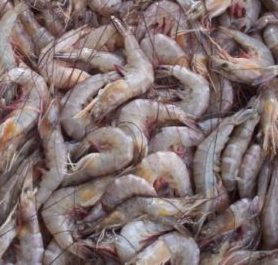
Louisiana Shrimpers seek more federal protection
Speaking during the Louisiana Shrimp Association meeting at the American Legion Hall in Houma, shrimpers said import tariffs aren’t enough to protect their business. And foreign companies should not be able to sell shrimp in the U.S. if they are using banned antibiotics. “We’re being treated differently than other businesses that are in the same situation we’re in,” said Dean Blanchard, owner of Dean Blanchard Seafood Inc. in Grand Isle. “We’re comparable to rice farmers and sugar-cane farmers.” When these farmers, many of them in Louisiana, couldn’t compete with imports, they received help, Blanchard said. The federal government provides them subsidies. He added that they would be out of business if they had to work as hard as shrimpers. >click to read<12:30
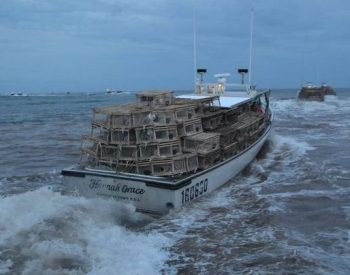
Fall lobster fishery is underway in Lobster Fishing Area 25
A crowd was on the dock with cameras, smart phones and cheerful waves as loaded lobster boats sailed out the mouth of Miminegash Harbour at 6 a.m. Thursday. They were there to see the fishermen off on setting day, the official start of the fall fishery in Lobster Fishing Area 25. The scene was repeated at wharves from Borden to Skinners Pond in the Northumberland Strait, and around North Cape at Seacow Pond and Tignish. >click to read<11:08
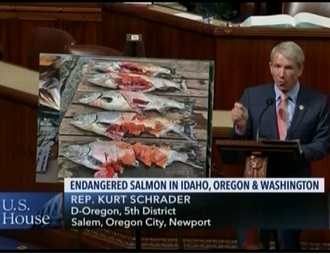
The clock is ticking,,, Endangered Salmon Prevention Act to remove problem sea lions faces time crunch
A bill making its way through the U.S. Senate would allow the states and tribal interests to remove problem sea lions in the Columbia River, including by lethal force, to reduce predation on endangered salmon and steelhead. However, the timeline for the passage of this legislation is growing very short.,, The bill was passed out of committee last week and will be addressed by the full senate soon, but there is a time constraint. If the bill is not passed before Congress adjourns for the year, its future is uncertain. SB 3119 represents the best effort to date to amend the MMPA since its inception to allow stronger management of problem sea lions. It specifically targets animals that take up positions at pinch-points where salmon are forced to concentrate and are easy prey for the pinnipeds. >click to read<10:36
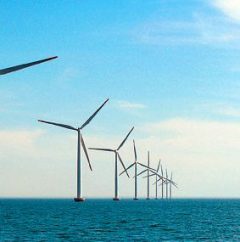
Bay State Wind alters layout for offshore wind farm, but fisheries call foul
Bay State Wind LLC is changing the turbine layout of its 800-MW Bay State Offshore Wind Project to accommodate the U.S. commercial fishing industry’s ability to work between turbines. But fisheries say the changes are too little, too late and underscore their growing frustration with the offshore wind sector. However, the commercial fishing industry is not satisfied with Bay State Wind’s changed layout. Meghan Lapp, fisheries liaison for Rhode Island-based frozen seafood producer Seafreeze Ltd., said one-mile-wide transit lanes can make it dangerous for trawl vessels to fish with their nets without hitting other boats or project infrastructure. Buffer zones for each side of a transit lane are also needed due to potential radar interference from the turbines. >click to read< 09:48
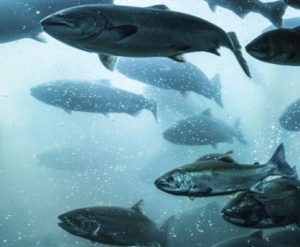
Chile accuses Marine Harvest of damaging environment after 600,000 salmon injected with antibiotics escape
Chile’s environment ministry on Monday (Aug 6) accused the local unit of Norway’s Marine Harvest of damaging the environment after hundreds of thousands of salmon escaped from one of the company’s fisheries last month. The ministry said in a statement that it had asked the State Defense Council, which represents the government in legal matters, to investigate the incident and initiate legal action against Marine Harvest with the aim of repairing the environmental damage. Some of the 600,000 fish that swam into the wild last month after a storm damaged enclosures near the southern city of Calbuco had been injected with a course of antibiotics that was incomplete at the time of their escape, making them unfit for human consumption. >click to read<08:49

Why the U.S. Needs More Worker-Owned Companies
The gap in wealth in the United States between the ultrawealthy and everyone else has reached its widest point in decades. One way to narrow the divide is through the use of worker buyouts, in which ownership of a company transfers from a single person or a small number of people to the workers of the company. Currently, about 10% of Americans hold equity stakes in their workplaces.,,, Worker buyouts are particularly likely to blossom in industries with organized workers who transition to union cooperatives. Last year 400 members of IAM Maine Lobstering Union bought the wholesale operation of Trenton Bridge Lobster Pound and turned it into a worker-owned cooperative called Lobster 207. >click to read<07:59

































